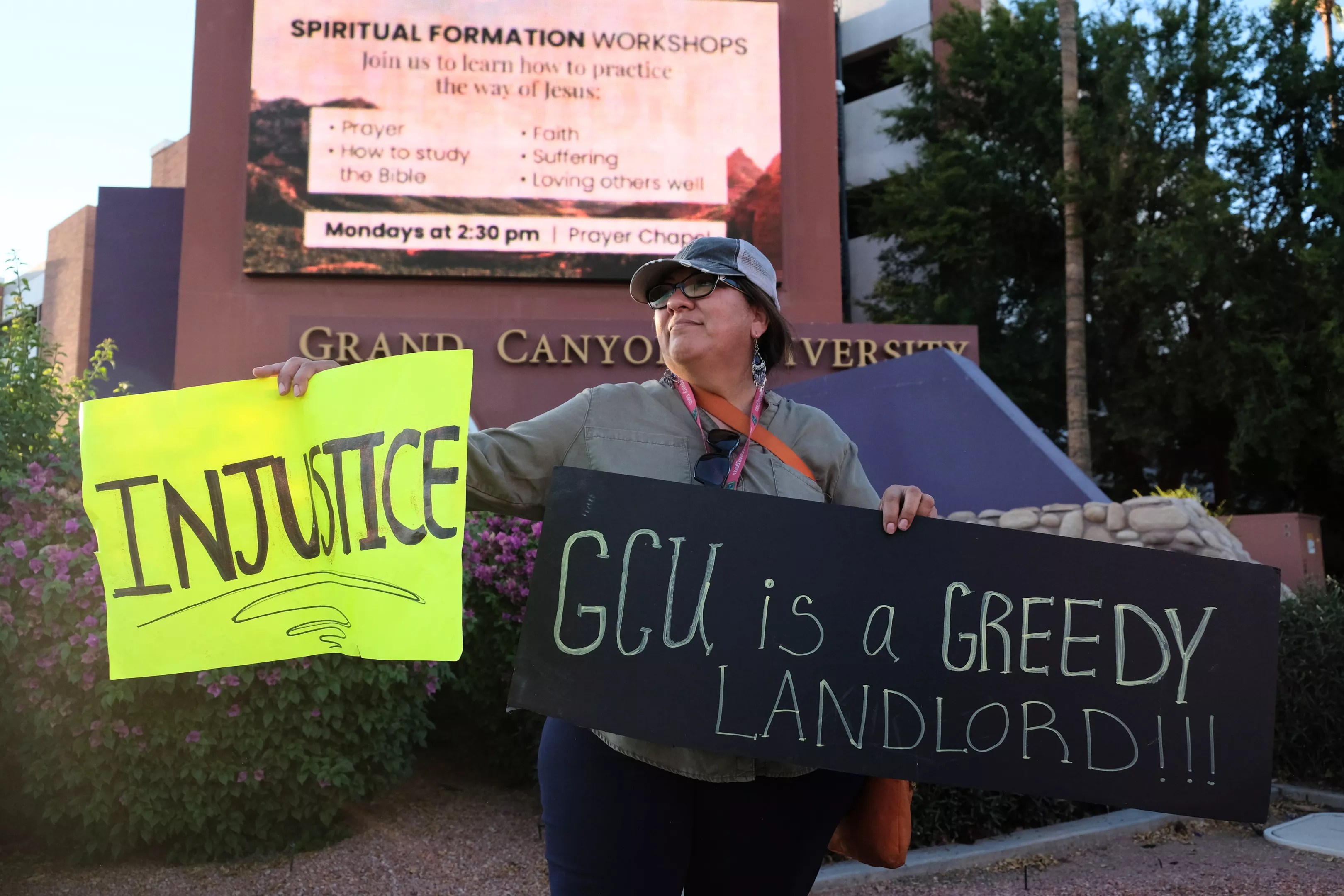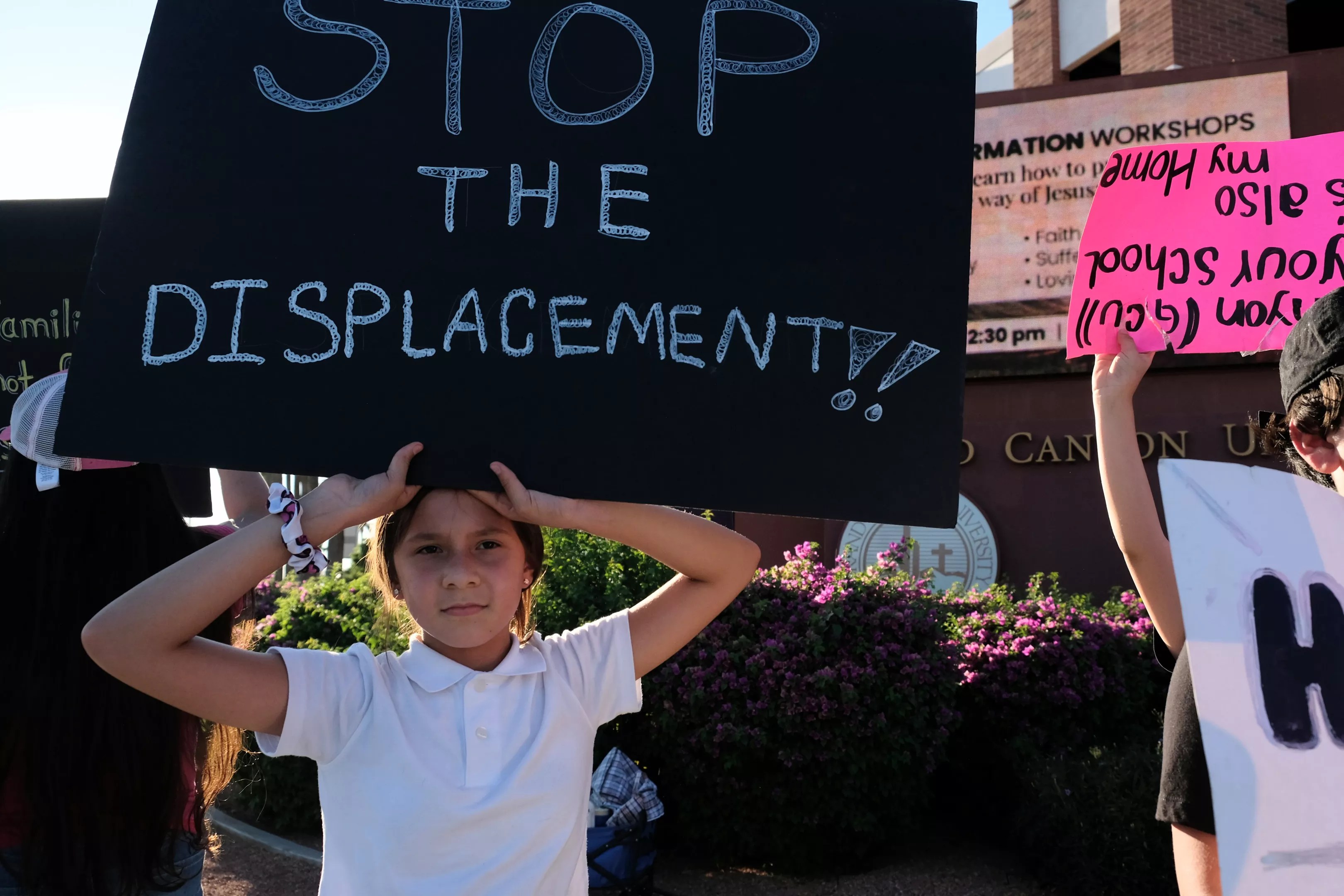
Katya Schwenk

Audio By Carbonatix
Months after Grand Canyon University first made public plans to kick out longtime residents of a small west Phoenix mobile home park to make way for a new development, the battle between the trailer owners and the school is not yet over.
On September 19, several dozen residents of the Periwinkle Mobile Home Park, which sits at 27th Avenue and Colter Street, gathered outside the university’s front gates on Camelback Road, holding signs and occasionally joining together in chants. For months, residents have been fighting the planned evictions by the school, which owns the property. Most have lived in the trailer park for years, if not decades, and said they have nowhere to go.
On April 29, the university notified residents that they had until October 30 to pack up and leave. After an initial outcry – which included lawmakers marching with residents through the streets – the trailer owners scored some concessions. GCU pushed the eviction date to May 28 and promised some assistance with finding new housing.
Residents want the university to give them a fair deal. GCU purchased the 4.65-acre property for $3.4 million in 2016. Grand Canyon Education, the publicly traded company that operates the Phoenix campus, had $260 million in income last year, according to a filing with the Securities and Exchange Commission.
Bob Romantic, a GCU spokesperson, did not respond to a call or email from Phoenix New Times seeking comment. In letters to residents, copies of which New Times reviewed, attorneys for the university acknowledged that evictions “can be a hardship or inconvenience” but pushed forward.
Alondra Ruiz Vazquez was one of the protesters on Monday evening. Ruiz has lived in the park with her husband for almost eight years, she said. Over the past several months, she banded together the park residents and pushed to save her home. “It feels so emotional,” she said as passing cars honked in support. “We love our community. We’ve known each other for so long.”
When Ruiz and others were informed that they had six months to leave, many didn’t even know GCU owned the property, residents said. They had only interacted with a property management company.
The school bought the park as part of an “aggressive” spending spree in the area, according to one broker who worked on the trailer park deal. Despite concerns about the university’s finances and contested nonprofit status that have dogged GCU for years, its enrollment has grown at a rapid pace. The Periwinkle Mobile Home Park is just a small piece of the university’s plan for an expanded 400-acre campus.

Children who live in the mobile home park protested alongside their parents.
Katya Schwenk
‘They Think We’re Trailer Trash’
Sylvia Herrera, a longtime community organizer in Phoenix with the Barrio Defense Committee, is helping organize the residents and negotiate with GCU. She told New Times that the homeowners want proper compensation for the upheaval that the evictions will cause. “We need a different model other than kicking people out,” she said.
Residents have access to funds from the state – for most, $7,500 per trailer – to move their homes to a new location. In reality, relocating the structures is not an option for many residents. Some of their trailers are old and too structurally unsound to be transported. Even if the trailers could be moved, many parks won’t accept trailers over a certain age.
Some residents may face abandoning their homes, an asset that sometimes has been passed down through generations. If they leave their trailer at the park, they are limited to $1,875 in state compensation.
Ruiz remembered the anxiety that filled the park when the first notice went out to residents in April. “We all knew we didn’t have any options,” she said. She expected many would be without a place to live. Even now that the deadline has been extended, that anxiety has not ebbed, she said.
Gerald Suter, who braved the heat to come out to protest like he did in June, said he is worried about what will become of him in May. The 83-year-old said that for a time when he was in elementary school, he and his family were homeless. For the last 28 years, however, Suter has lived peacefully in the Periwinkle Mobile Home Park. “I sleep. I dream about being on the street. I wake up,” he said.
“They think we’re trailer trash,” Suter commented. But the Periwinkle residents, he added, “are the finest people you’ll ever meet.”
As apartment rents skyrocket in metro Phoenix, mobile homes are often a rare, stable refuge for low-income people. The residents who spoke with New Times had lived in the Periwinkle park for more than five years. Several had lived there for decades. Slowly, though, the rush of development in Phoenix has threatened these refuges. Out-of-state investors, in some cases, have bought mobile home parks around the state with plans to redevelop the land or convert the parks into vacation spots for tourists in RVs.
Since the first Periwinkle protest in June, GCU has said it would pair residents with housing counselors from Trellis, a nonprofit that generally focuses on home ownership assistance. The school also said in its August 30 letter that it would provide unspecified assistance.
GCU also offered free academic tutoring to children in the Periwinkle park for a year, which some residents found in poor taste. Ruiz noted that GCU had been a neighbor for years without offering educational resources to the community.
As the protest came to a close, residents gathered to plan ahead. Before the end of the month, they will be meeting with Trellis and GCU to negotiate. Yellow flyers that demonstrators handed out outlined their demands: compensation for all park residents and a transition plan, outlined in a four-year contract. They also want whatever multifamily development GCU plans for the property to include affordable housing for low-income residents.